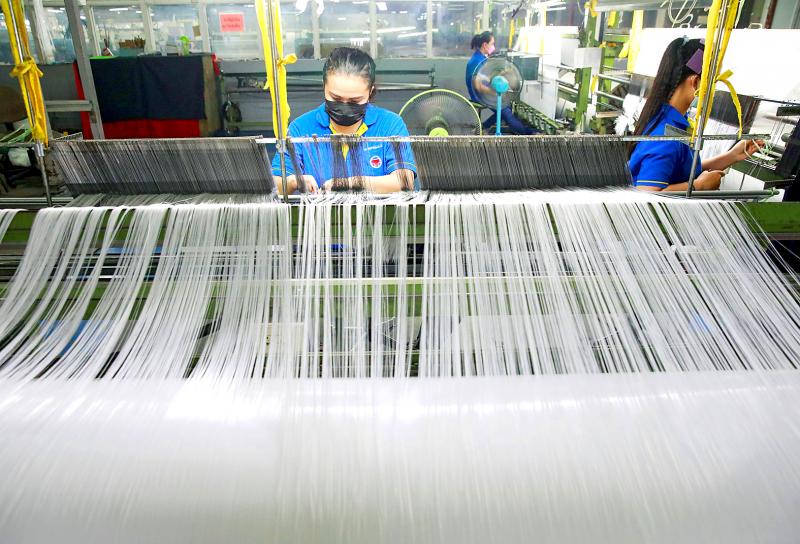With an abundance of plastic waste, but a scarcity of personal protective equipment (PPE), Thailand is turning trash into treasure by upcycling bottles into protective clothing for people at risk of COVID-19 infection.
Millions of plastic bottles have been collected, shredded and turned into threads to be weaved into fabrics eventually used for PPE, either for hospitals or Buddhist temples, where monks have been cremating people who have died of the disease.
“There are times where it is very difficult to get hold of PPE suits, sometimes even if you have money, you can’t buy, but now we’re making it out of upcycling plastic bottles, so what’s trash is now valuable,” said Phra Maha Pranom Dhammalangkaro, abbott of Chakdaeng temple in Samut Prakan Province near Bangkok.

Photo: Reuters
Temple volunteers have been sewing orange PPE suits for monks, undertakers and scavengers, and PPE is being sent to thousands of temples.
Although these are not medical-grade, they provide at least some protection for those potentially exposed to COVID-19, and one PPE suit can be made using only 18 plastic bottles.
The fabric for the PPE is being donated by a textile factory in Rayong Province that usually makes fabrics used by global brands.
At the factory, threads are made from recycled bottles and spun into a giant roll, then weaved into fabric that gets treated to become water resistant.
“This is so that it can prevent particle dust from seeping through and the virus from coming into contact with us,” said Arnuphap Chompuming, head of sales and marketing at textile firm Thai Taffeta, which operates the factory east of Bangkok.
About 18 million plastic bottles have been used since the middle of last year to make fabric for PPE, which has been sent to hospitals across the country, he said.
Phra Maha Pranom Dhammalangkaro said that the upcycling project was helping to ensure more people were protected, not only medical professionals.
“We’re saving lives and the environment as well,” he said.

Nauru has started selling passports to fund climate action, but is so far struggling to attract new citizens to the low-lying, largely barren island in the Pacific Ocean. Nauru, one of the world’s smallest nations, has a novel plan to fund its fight against climate change by selling so-called “Golden Passports.” Selling for US$105,000 each, Nauru plans to drum up more than US$5 million in the first year of the “climate resilience citizenship” program. Almost six months after the scheme opened in February, Nauru has so far approved just six applications — covering two families and four individuals. Despite the slow start —

North Korean troops have started removing propaganda loudspeakers used to blare unsettling noises along the border, South Korea’s military said on Saturday, days after Seoul’s new administration dismantled ones on its side of the frontier. The two countries had already halted propaganda broadcasts along the demilitarized zone, Seoul’s military said in June after the election of South Korean President Lee Jae-myung, who is seeking to ease tensions with Pyongyang. The South Korean Ministry of National Defense on Monday last week said it had begun removing loudspeakers from its side of the border as “a practical measure aimed at helping ease

DEADLY TASTE TEST: Erin Patterson tried to kill her estranged husband three times, police said in one of the major claims not heard during her initial trial Australia’s recently convicted mushroom murderer also tried to poison her husband with bolognese pasta and chicken korma curry, according to testimony aired yesterday after a suppression order lapsed. Home cook Erin Patterson was found guilty last month of murdering her husband’s parents and elderly aunt in 2023, lacing their beef Wellington lunch with lethal death cap mushrooms. A series of potentially damning allegations about Patterson’s behavior in the lead-up to the meal were withheld from the jury to give the mother-of-two a fair trial. Supreme Court Justice Christopher Beale yesterday rejected an application to keep these allegations secret. Patterson tried to kill her

CORRUPTION PROBE: ‘I apologize for causing concern to the people, even though I am someone insignificant,’ Kim Keon-hee said ahead of questioning by prosecutors The wife of South Korea’s ousted former president Yoon Suk-yeol yesterday was questioned by a special prosecutor as investigators expanded a probe into suspicions of stock manipulation, bribery and interference in political party nominations. The investigation into Kim Keon-hee is one of three separate special prosecutor probes launched by the government targeting the presidency of Yoon, who was removed from office in April and rearrested last month over his brief imposition of martial law on Dec. 3 last year. The incident came during a seemingly routine standoff with the opposition, who he described as “anti-state” forces abusing their legislative majority to obstruct